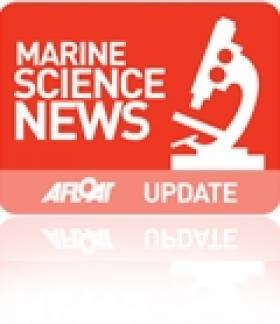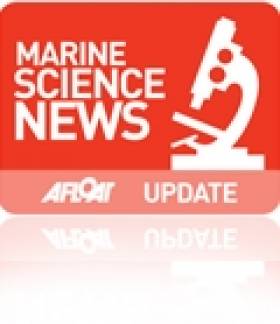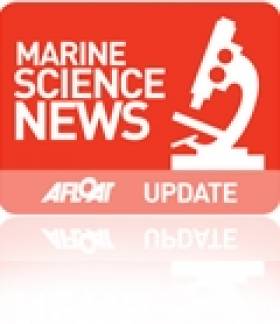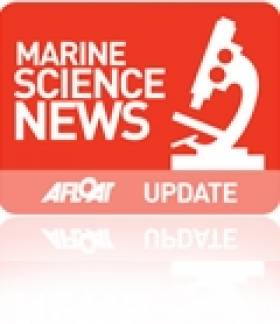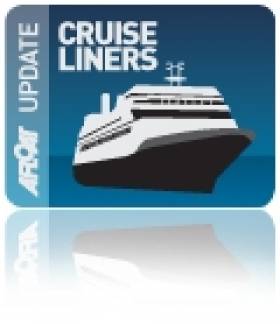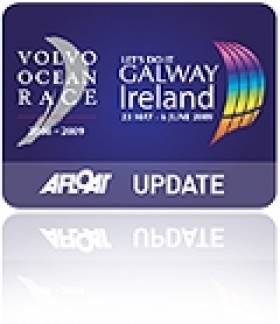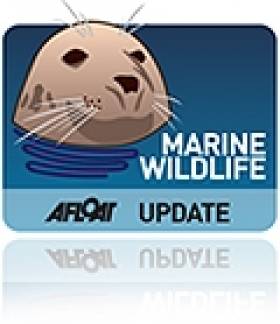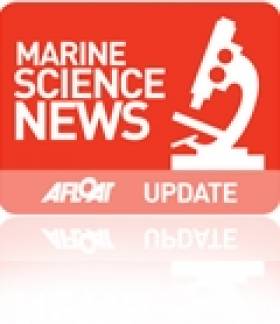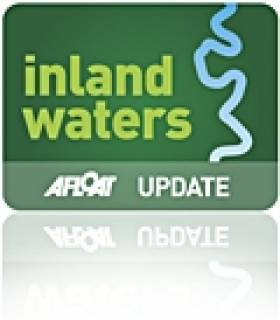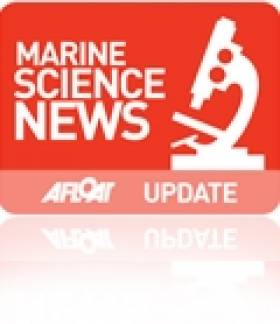Displaying items by tag: marine science
Galway's Sea2Sky Celebrates European Researcher’s Night in Ireland
#MARINE SCIENCE - Galway will celebrate European Researchers’ Night on Friday 28 September together with 320 cities around Europe with its latest Sea2Sky event.
Sea2Sky, organised by NUI Galway in collaboration with the Marine Institute, Galway Atlantaquaria and its new partner CIT Blackrock Castle Observatory in Cork, will showcase science on the grandest of scales themed around marine science, atmospherics and astronomy.
The main events will be held at the Galway Bay Hotel, Leisureland and Galway Atlantaquaria, with events also taking place in CIT Blackrock Castle Observatory in Cork.
“Irish researchers are involved in some huge European research projects, and this is an opportunity to share some of the most exciting elements with the public," said event organiser and NUI Galway physics lecturer Dr Andy Shearer.
"At third level, we have seen a surge in applications for science related courses and this event will be a real draw for anyone tempted by a career in science and research.”
Last year some 10,000 people came to the event, and the plan is for an even bigger event this year, with highlights including the CERN exhibit, 3D tours of the universe and tours of the aquarium. This year visitors can participate in experiments, competitions and quizzes, watch demonstrations and simulations, exchange ideas and get to know the researchers on the free family day.
Among the showcase exhibits at the Marine Institute will be the ROV Holland 1 and a weather buoy. Scientists and technicians will be on hand to explain the work of their equipment and recent expeditions.
Inside, Marine Institute scientists will exhibit work relating to the marine environment (such as algal blooms), weather monitoring and oceanography, advanced mapping techniqyes, research vessel operations conducted by the R/V Celtic Voyager and R/V Celtic Explorer, and the Explorers Education Programme, which highlights the seashore as a vital teaching resource.
There will also be screenings throughout the day of a short film showing the newly discovered and previously uncharted field of hydrothermal vents along the Mid-Atlantic Ridge captured by Holland 1 last year.
Footage of the cold water corals and life under the sea at depths of 3,000 metres taken during the Biodiscovery and Ecosystem Survey of the Whittard Canyons will also be shown.
This year, Sea2Sky is linking up with the Galway Science Forum’s exhibition about the work of CERN – Accelerating Science. This exhibition, sponsored by Boston Scientific in partnership with NUI Galway, will show how CERN’s Large Hadron Collider can help us understand fundamental questions about the origins of the universe.
For further details of the event, visit www.sea2sky.ie.
Places Open On Science@Sea Training Courses for Marine Students
#MARINE SCIENCE - The Strategic Marine Alliance for Research and Training (SMART) has opened the call for applications for Science@Sea research vessel-based training courses aimed at students of marine-related sciences.
Science@Sea courses have been running since 2008 and are recognised by the Institute of Marine Engineering, Science and Technology (IMarEST) as a means of contributing towards a student’s professional development and career.
The two-day training courses will be held between 7 and 12 November 2012 in waters off Cork and will offer students the opportunity to gain practical, hands-on experience onboard the national research vessel RV Celtic Voyager.
"Science@Sea is unique in that it gives students of marine related sciences a complete guide to working at sea," said SMART national co-ordinator Dr Paulha McGrane. "This not only increases national capacity in carrying out research survey operations but provides graduates with a competitive edge on the national and international jobs market.”
Dr McGrane explained that Science@Sea focuses on practical, cross-disciplinary skills such as sample collection and processing, operation of equipment and instrumentation, and data acquisition and processing.
"Other areas we look at, which are essential to working at sea, include survey design and planning, safety at sea, and post-survey analysis and assessment. To date, students who have participated in Science@Sea have found the course of enormous benefit in securing employment."
Course dates are as follows:
- Postgraduates: 7-8 November 2012
- Undergraduates 1: 9-10 November 2012
- Undergraduates 2: 11-12 November 2012
Applications for Science@Sea and posters advertising the course are available online HERE. Completed applications should be received no later than Friday 5 October 2012.
Please note an administration fee of €50 applies and participants are liable for their own transportation and accommodation costs in Cork. For queries relating to any aspect of the course, contact [email protected]
Science@Sea is provided by SMART, a marine science partnership programme that provides quality offshore training for students of marine science, technology and engineering. The programme is carried out under the Sea Change strategy with the support of the Marine Institute and the Marine Research Sub-programme of the National Development Plan 2007–2013. Core partners include the National University of Ireland, Galway; University College Cork; Galway-Mayo Institute of Technology; Cork Institute of Technology; the National Maritime College; and the Marine Institute; with additional funding by the Higher Education Authority.
Getting Into the Smarts Behind SmartBay as Noise Data Project Switches On
#MARINE SCIENCE - Apart from some of the world's largest concentrations of wave energy, the waters of Galway Bay and the west coast of Ireland are now providing something potentially even more valuable - information.
That's according to IBM's Harry Kolar writing for the blog A Smarter Planet, as he discusses the start of his company's new underwater data collection project developed in association with the Sustainable Energy Authority of Ireland (SEAI) and the Marine Institute.
As previously reported on Afloat.ie, the system comprises an array of noise sensing equipment such as hydrophones deployed in Galway Bay to monitor the noise levels produced by wave energy conversion devices in real time.
This array is attached to a large monitoring buoy about 2km from the southern shore, and constantly transmits the data it records to a receiving system on land.
The scheme, which was finally switched on last month, is an offshoot of the SmartBay initiative for developing and testing new marine technology to foster future commercial development in the fast-growing marine science sector. The 'Twitter buoy' deployed for the Volvo Ocean Race finale recently is another of the project's schemes.
"Initially, the system will capture and analyse the ambient noise of the ocean to establish a baseline of acoustics including natural and anthropogenic (man-made) sound sources including vessel traffic," writes Kolar.
"But the ultimate goal is to capture and analyse the sounds and vibrations of hulking wave energy conversion machines that have begun bobbing along off the coast and help determine what, if any impact the sound waves from those devices could have on marine life – but especially highly sensitive dolphin, porpoise, and whale populations."
A Smarter Planet has much more on the story HERE.
School Photo Competition Focuses on Water - Our Greatest Resource
#schoolproject – A Transition Year Photo Competition, entitled Water - Our greatest Resource, has been launched that will offer transition year students in Galway and Mayo an opportunity to conduct scientific research onboard the Marine Institute's research vessel the RV Celtic Voyager, in Galway Bay on Sunday October 7th as part of GMIT's 40th anniversary celebrations.
This competition celebrates over 25 years of marine scientists training with GMIT, as well as the close association GMIT has with the Marine Institute, particularly with the use of the national research vessels used for training expeditions.
Dr Peter Heffernan, CEO of the Marine Institute welcomed the Science@Sea initiative saying, "This competition and the work of SMART (Strategic Marine Alliance for Research and Training) programme highlights the importance of creating opportunities towards a student's professional development and career. The programme continues to provide quality offshore training for students of marine science, technology and engineering which is highly relevant to the realisation of the economic potential of our marine resources".
On Sunday the 7th of October the RV Celtic Voyager will leave from the docks in Galway for a marine survey centred on the core disciplines of Benthic Ecology, Fisheries Biology, Marine Geophysics and Oceanography. The expedition will be led by experienced scientific personnel from the Strategic Marine Alliance for Research and Training and Galway-Mayo Institute of Technology.
Dr Des Foley, Head of the School of Science, and Research and Innovation at GMIT, thanked the Marine Institute for providing the RV Celtic Voyager for this special occasion. He added, "the unique access to Marine Institute vessels over the years has given our students and graduates a fantastic opportunity to train at sea and to acquire practical skills which are second-to-none. I would also like to thank our own staff, some of whom are now retired, who developed and delivered ship-based training and education programmes and to recognise such innovation as part of our 40th anniversary celebrations."
Using state of the art equipment and instrumentation students will work alongside scientists to investigate physical, chemical and biological aspects of Galway Bay and learn about potential careers in marine science and technology. Ireland is poised to realise the full potential of her ocean resource and transition year students with a strong aptitude for science, engineering and technology now have an opportunity to whet their appetite for this adventure.
The "Water - Our Greatest Resource" competition can be entered by uploading the photo entry and description to the GMIT Facebook page: https://www.facebook.com/GmitSchoolsLiaisonOffice.
Application are asked to submit a photograph of an aspect of Ireland's ocean that interests them with no more than 200 words of text explaining its significance. Each photo entry must include:
Your Name
Your School
A Contact Number/Email
Your Photo
A 200 word photo description
Please visit http://www.gmit.ie/slo/ for more information.
Please note: Applications should be supported by the Transition Year coordinator in your school and a letter of permission from parent or guardian.
The closing date for applications online is Friday 21st of September 2012.
'Floating Campus' MV Explorer to Visit Galway This Friday
#CRUISE LINERS - Galway Bay is set to welcome a visit from the 'floating campus' MV Explorer this Friday 21 August, as the Galway Independent reports.
The cruise liner, with more than 800 students, academics and crew on board, operates as part of the Semester at Sea study abroad programme which invites students from 25 universities across the Unites States to travel the world and experience its diversity.
PhD student Sarah Cosgrove of NUI Galway's Ryan Institute for marine science - who joined the cruise at its last port of call in Halifax, Nova Scotia - will talk to the visiting students about Galway, its port and the university.
At 590 feet in length, the 10-year-old vessek is too large to enter Galway Harbour so will instead drop anchor out in Galway Bay.
Its arrival follows that of two other liners, Le Diamant and the Discovery, that arrived in Galway in Friday 17 August with 1,400 passengers and crew between them. Both are set to return to the City of the Tribes next month.
The Galway Independent has much more on the story HERE.
#VOLVO OCEAN RACE - It has been revealed that a new coastal radar system developed at NUI Galway was instrumental to the success of the PUMA team in the in-port races at the recent Volvo Ocean Race finale.
The radar system, which measures currents and waves throughout Galway Bay on the hour, is run by Dr Mike Hartnett’s research group in the newly launched Ryan Institute at NUI Galway.
The sophisticated system is normally used for advanced marine research, but PUMA Ocean Racing performance coach Robert Hopkins Jr contacted the researchers to see if their radar data could be used by his crew to get the edge on the CAMPER team, with which they were tied on points.
Maps of the currents in the bay over the past month were made available to PUMA and Dr Hartnett advised team on their sailing strategy for the important race.
PUMA went on to win in great style and win the series by a one-point margin. The win also marked PUMA’s first trip to the top of the podium for an in-port race in this round of the Volvo Ocean Race.
PUMA finished on the podium in nine of the 10 in-port races, collecting 45 total points to win the overall In-Port Race Series.
Hopkins was delighted with the result. “Currents in Galway Bay were a big factor in the in-port race, where tides, wind and river outflow make it all very complicated," he said. "To prepare for the race, we looked for surface current patterns in hundreds hours of data from the NUI Galway radar, took on-the-water readings before the start, and data from Mar Mostro’s own Doppler velocity log supplied by Nortek AS. It worked and we won the race.”
The NUI Galway radar data will soon be available online to the public, hopefully helping local sailors to improve their performance.
Dr Hartnett acknowledged the assistance provided by two local businessmen in enabling this advanced technology.
“The Spiddal radar site is sending its data back to the computers at NUI Galway via the broadband service of An Crúiscín Lán, thanks to the permission of owner John Foy.
"Similarly, Liam Twomey, general manager of the National Aquarium of Ireland, Salthill, provided access to their broadband to courier the Mutton Island radar data back to NUI Galway.”
#MARINE WILDLIFE - The Irish Whale and Dolphin Group (IWDG) reports that two marine science students from the Galway-Mayo Institute of Technology (GMIT) have joined IWDG members on an eight-day transatlantic cetacean and bird survey on board the RV Celtic Explorer.
"The mid-Atlantic is rarely surveyed for marine mammals so the results of this survey will be a large contribution to our limited knowledge of the species richness and relative abundance in this region at this time of year," said the IWDG's Conor Ryan.
"Last year, we surveyed a similar route during the winter/late spring and encountered fin whales, sperm whales, bottlenose dolphins, striped dolphins, common dolphins and pilot whales."
Students Paddy O'Dwyer and Enda McKeogh are keeping a daily blog of the trip for those interested in following them across the Atlantic which can be read HERE.
Ireland and UK Sign Marine Research Agreement
#MARINE SCIENCE – Dr Peter Heffernan CEO, Marine Institute, and Prof Ian Wright, Deputy Director, Science and Technology, National Oceanography Centre (UK) signed a Memorandum of Understanding (MoU), to-day (24th April), in the presence of the Minister for Agriculture, Food and the Marine, Simon Coveney, TD, to foster closer co-operation and joint activities between Ireland and the UK in the area of marine research, development and innovation.
Co-operation planned is strategic and will reflect areas of mutual interest including: hydrography, seafloor and habitat mapping of the Atlantic; the development of fixed point ocean observatories; sensor development and associated platforms, and knowledge transfer and policy advice.
Minister Coveney, welcoming the MoU, re-stated the government's view that research and innovation are key drivers of economic development and recovery as outlined in the national Consultation Document: Our Ocean Wealth - Towards on Integrated Marine Plan for Ireland (www.ouroceanwealth.ie ) and the National Research Prioritisation Exercise.
"The priorities to be pursued in the Integrated Marine Plan for Ireland, will in turn feed into the European Union Strategy for the Atlantic (EUSA) Action Plan (2014-2020) which would be guided by the Europe 2020 Strategy for smart, sustainable and inclusive growth and the Integrated Maritime Policy for the European Union fostering 'Blue Growth', said Minister Coveney."
Dr Heffernan said "With European Research (Horizon 2020) and Cohesion Policy Funds, for the period 2014-2020, having shared objectives linked to the smart growth objective of the Europe 2020 Strategy, we anticipate an even greater focus on the importance of co-operative research across the European area."
"To access this highly competitive co-funding, strong partnerships between leading European research institutes and knowledge-based SMEs will be essential. The Marine Institute and the National Oceanography Centre are well placed both scientifically and geographically to benefit from these funding opportunities in terms of Horizon 2020 funding with its focus on excellence in research and innovation and targeting investments towards addressing societal challenges and fostering competitiveness in industry."
Professor Wright, said: "The National Oceanography Centre is committed to forging mutually beneficial international partnerships and we look forward to building on our already strong collaborative work with the Marine Institute."
The Marine Institute and the National Oceanography Centre have already co-operated, in association with National Geographic TV, University College Cork (UCC), the National University of Ireland, Galway (NUIG), the Geological Survey of Ireland (GSI) and the University of Southampton, in the 2011 VenTURE Survey which discovered a new hydrothermal vent field on the mid-Atlantic ridge. This will be the subject of special Royal Irish Academy (RIA) lecture "Alien world: New discoveries of exotic life forms & volcanic metal chimneys in the deep ocean" to be held on the evening of 24th April (www.ria.ie/events/events-listing/marine-institute-ria-lecture.aspx ).
Trial Dredging to Help Rid Barrow of Invasive Asian Clam
#INLAND WATERWAYS - Trial dredging operations to curtail the spread of Asian clams at designated sites in the lower River Barrow are set to conclude today.
Inland Fisheries Ireland (IFI) employed the use of a a traditional cockle harvesting boat to physically remove the clams from the river bed, in an effort to explore methods of controlling or eradicating what it describes as an "ecosystem-changing invader" in other infested waters.
IFI scientists supervised the trials, using teams of divers to quantify the result of the dredging efforts.
The Asian clam (Corbicula fluminea) is "a most unwelcome addition to the fauna of the lower River Barrow". The bivalve mollusc is regarded as "one of the most notorious aquatic invasive species in the world".
First recorded in the river downstream of St Mullin’s in April 2010, subsequent IFI studies have revealed that the Asian clam is firmly established in the lower Barrow and in the River Nore downstream of Inistioge. Populations have also been recorded in the River Shannon and in Lough Derg.
In one section of the River Barrow the clam has achieved a "staggering" density of almost 10,000 per square metre.
Dr Joe Caffrey, senior scientist with IFI, said of the trial dregding: “It is imperative that every effort is made to control the expansion and spread of this highly adept invasive species.
"The results from these trials will inform future national management plans for this most unwelcome non-native species and will, at the very least, dramatically reduce the numbers of individuals in the test sites.
He added: "In tandem with these trials, research effort is being focused at producing other control methods that can be targeted as this species.”
Ireland and US Cooperate on Offshore Renewable Energy Research
Energy Minister, Pat Rabbitte has welcomed the signing of a Memorandum of Understanding on offshore renewable energy research cooperation with the United States Department of Energy.
The memorandum was signed on his behalf in Washington last week during the Taoiseach's visit to the US. Dr Peter Heffernan, CEO of the Marine Institute signed on behalf of Ireland and Dr Henry Kelly, Assistant Secretary in the Department of Energy signed on behalf of the US.
Ireland has a sea area that is around 10 times the size of its land area. Ireland's location at the edge of the Atlantic Ocean ensures one of the best wind and wave resources in Europe. There is very significant potential in utilising these resources in the medium to long term to generate carbon free renewable electricity.
According to Minister Rabbitte, "Wave energy technology is still very much at the research, development and deployment stages and the Memorandum signed will result in increased co-operation between Ireland and the US. Both countries have an interest in encouraging and improving technology development in this sector and the Memorandum builds on an excellent working relationship fostered by previous joint marine renewable events held in Galway, Washington and Farmleigh over the past few years."
Collaboration under this Memorandum will involve research co-operation in the field of wave and tidal energy, involving marine and hydrokinetic energy technologies. The Minister observed, "The co-operation is planned to be strategic, concentrating mainly on technologies which are not yet commercially viable but which might offer significant renewable energy potential. Mutual co-operation will lead to increased investment opportunities in the Sector, initially as projects develop through the research and demonstration phases and also through increased academic cooperation. "
While the Sustainable Energy Authority of Ireland have a dedicated Ocean Energy Research Unit, other bodies that might take part in such research cooperation from the Irish perspective include the Marine Institute, the Hydraulics and Maritime Research Centre, University College Cork, and other appropriate entities.
Possible participants from the US side are National Energy Laboratories and National Marine Renewable Energy Centers such as the National Renewable Energy Laboratory, Sandia National Laboratories, the Northwest National Marine Renewable Energy Center, the National Marine Renewable Energy Center of Hawaii, and the Foundation for Ocean Renewables.
The IDA and Enterprise Ireland are also closely involved in developing and assisting the Ocean Energy Sector. They both acknowledge research and development opportunities in the sector - even at the early stages of development that the sector is currently in - and recognise the long term potential of Ireland becoming a development and deployment centre for the industry.



























